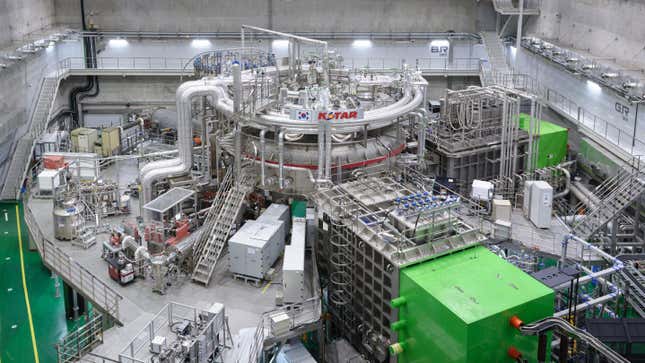The Korea Institute of Fusion Vitality has put in a brand new diverter within the KSTAR tokamak, permitting the unreal solar to maintain high-ion temperatures exceeding 100 million levels Celsius for longer.
KSTAR—referred to as a synthetic solar as a result of it does nuclear fusion, the identical response that powers our star—was accomplished in 2007 and achieved its first plasma in 2008. It’s about one-third the dimensions of ITER, the massive experimental reactor being in-built France. Each reactors are tokamaks: doughnut-shaped units that do nuclear fusion with plasmas, or electrically charged gases dropped at super-high temperatures and pressures.
KSTAR makes use of a diverter, which sits on the backside of the tokamak and manages waste gasoline exhaust and impurities from the reactor. The diverter is a plasma-facing part, which means it sits inside the tokamak and bears the total brunt of the interior floor warmth. Presently, KSTAR is able to plasma operations for about 30 seconds; scientists hope that the brand new diverter will enable plasma operations for 300-second intervals by the top of 2026.

KSTAR initially had a carbon diverter, however in 2018 scientists started engaged on a tungsten diverter for the tokamak. Tungsten has the next melting level than carbon and improves the warmth flux restrict of the reactor two-fold, in response to a latest release from Korea’s Nationwide Analysis Council of Science and Expertise. A prototype of the brand new diverter was accomplished in 2021, and set up was completed final 12 months.
“In KSTAR, now we have applied a diverter with tungsten materials which can be the selection made in ITER,” stated KFE president Suk Jae Yoo within the launch. “We’ll attempt to contribute our greatest efforts in acquiring the required information for ITER by KSTAR experiments.”
Analysis into nuclear fusion has might gradual however important strides; in 2022, scientists at Lawrence Livermore Nationwide Laboratory managed net energy gain in a fusion reaction for the primary time. We’re nonetheless very (read: very) removed from the vaunted aim of a dependable, zero-carbon power supply, and the achievement got here with caveats, however it nonetheless confirmed that the sector is plodding ahead.
ITER’s first plasma is predicted in 2025, and first fusion is slated for 2035. However the reactor’s timelines have slipped whereas its prices have ballooned, from about €5 billion in 2006 to over €20 billion, according to Scientific American, so we could also be ready even longer than that.
Nonetheless, these are heady instances for tokamak reactors. Last month, the six-story JT-60SA reactor in Japan was inaugurated; researchers affiliated with the undertaking estimate it’s going to take two years for the reactor to develop plasmas wanted for experiments. There are greater than 50 tokamaks working world wide, according to the International Atomic Energy Agency.
Plasma experiments with KSTAR’s new tungsten diverter will proceed by February, in response to the Nationwide Analysis Council of Science and Expertise, because the tokamak scientists ensure the surroundings is secure for experiments and that the 100-million-degree plasma might be reproduced in it.
Trending Merchandise

Cooler Master MasterBox Q300L Micro-ATX Tower with Magnetic Design Dust Filter, Transparent Acrylic Side Panel, Adjustable I/O & Fully Ventilated Airflow, Black (MCB-Q300L-KANN-S00)

ASUS TUF Gaming GT301 ZAKU II Edition ATX mid-Tower Compact case with Tempered Glass Side Panel, Honeycomb Front Panel, 120mm Aura Addressable RGB Fan, Headphone Hanger,360mm Radiator, Gundam Edition

ASUS TUF Gaming GT501 Mid-Tower Computer Case for up to EATX Motherboards with USB 3.0 Front Panel Cases GT501/GRY/WITH Handle

be quiet! Pure Base 500DX ATX Mid Tower PC case | ARGB | 3 Pre-Installed Pure Wings 2 Fans | Tempered Glass Window | Black | BGW37

ASUS ROG Strix Helios GX601 White Edition RGB Mid-Tower Computer Case for ATX/EATX Motherboards with tempered glass, aluminum frame, GPU braces, 420mm radiator support and Aura Sync










